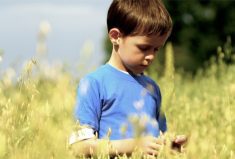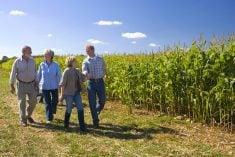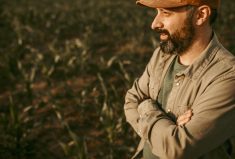Transitioning the farm to the next generation is an emotionally loaded process. Sometimes, not surprisingly, it can get bogged down and no one really knows what to do to get things moving again.
This is a pattern Humboldt, Sask. farm succession coach Patti Durand has ofen seen when working with 350 farm families from across Canada.
But Durand has also found a potential cure. If the younger generation gets a better idea of the highs and the lows that the senior generation went through while building up the farm, the transition planning process often gets back on a positive footing.
Read Also

How scientists are using DNA and climate data to breed crops of the future
A method for forecasting how crops will perform in different environments so that plant breeders can quickly select the best parents for new, climate-resilient varieties.
Durand says she witnessed first-hand the difference it can make when the older generation shares their memories with the younger generation.
The farm’s history wasn’t completely new to the incoming generation. On almost every farm, they’d heard stories from older relatives while growing up. But they didn’t get the whole story, only disconnected bits and pieces, Durand says.
Or, they only heard the stories when they were very young or in their teens at most, so they weren’t really able to comprehend the reality of what their parents and forebears went through.
- RELATED: Advice for young farmers
Yet that represents the sum total of their knowledge about how the farm got to where it is today.
In effect, their idea of how you built the farm is a children’s story.
Working as a third-party facilitator, Durand says she was able to create space for conversations between the older and younger generations that led to suddenly seeing why certain decisions had been made. “The stories can also answer a lot of why’s,” Durand says. “Like, for example, why is Dad so resistant to a particular idea.”
When working with families in difficulty during the transition process, Lydia Carpenter, a farm succession coach from Belmont, Man, also found that intentionally creating space to tell and receive stories helped to get the process moving forward again.
“We don’t always take the time for it in agriculture,” says Carpenter. “It’s a beautiful thing to share stories to understand and appreciate one another.”
Storytelling — or “participatory narrative inquiry,” as it is called by the experts — is a technique that communities, organizations and corporations have used for years to make better, more grounded decisions.
“It’s simple but powerful,” says Carpenter.
The stories “colour in the pictures,” Durand says, and they provide context for why people operate the way they do and why some things are non-negotiable. When done right, she says, this sharing of intergenerational stories becomes healing and can improve family and business cohesion.
Guelph, Ont. farm succession coach Maggie Van Camp agrees. “It’s an important process for the exiting generation to share the history of the farm with the whole family. It’s part of the aligning goals process… of identifying the value of continuing the legacy of the family farm.”
Where to start
Durand says it can be helpful to bring the whole family together in a neutral space such as a hotel boardroom or a community hall to hear the stories, but be sure everyone will focus on the stories, so don’t choose a vacation spot or even a holiday meal.
On the other hand, one-on-one opportunities for sharing stories can also be very effective, Durand says, and younger generations can seek out multiple older relatives, such as grandparents, uncles or aunts. Tell those older sources you’re doing this, and ask them to tell the story of the business as far back as they care to go. Do suggest, though, they put people in the centre of the story.
“It’s easy to think about the land and the animals but the births, deaths, marriages, divorces and estrangements are all in the same pot in family farms,” she says.
Carpenter recommends thinking in advance about how to get the conversation going. “Questions like ‘Tell me the story of your transfer. When did you get your first piece of land? What was it like to immigrate to Canada? What were your hopes and dreams?’ have helped to draw out essential personal and farm histories.”
And if you aren’t getting where you want to go, have some gentle prompts at the ready, says Durand. She has found that phrases such as “Help me to understand”, “Tell me more” or “What haven’t we talked about that’s important?” have been effective, but even then, she recommends setting aside lots of time and having a patient mindset.
Durand also says you’ll be glad in the long run if you capture the stories either by taking notes or by recording audio or video.
Also consider writing important dates on a piece of paper and using it as a physical timeline that will help the next generation keep the individual steps in the farm’s history in context.
Making history today
You may even grow to like the idea of starting up a journal in order to preserve the history that you are making today.
That’s what happened to Mary Pat Sass, who farms in northern Illinois with her husband and his family and wanted to capture the memories of older family members involved in the farm via her Grounded Journal (groundedjournals.co).
According to the website, the memoir journal is “a simple way to preserve stories of success and struggles, joyful moments and lessons learned.” The hand-written journals make nice heirlooms to pass down to the next generation.
Van Camp is launching a new service that will create farm family legacy video stories to capture the history of the family farm through interviews with the older generation (loft32.ca/farmersbridge).
“This process is particularly useful for the beginning of succession as a way to build understanding within the family and create aligned goals for the future,” she says.
Durand notes that sometimes it will be painful for a parent to tell a story. If they were close to bankruptcy, they may feel shame or mental distress, for example. She stresses that it’s important for the younger generation to listen with compassion. “Be gentle with the parents by saying ‘Obviously this is hard but it will help me to understand’, ”
In these cases, it can be helpful to bring in a third-party facilitator, such as a transition coach, clergy member, trusted friend, or professional farm advisor to create a safe space that allows for deeper sharing, advises Durand.
But she warns it’s also important to respect an individual’s right to share only what they feel comfortable with, and, if they appear to be in mental distress or struggling with addiction, to be sure to offer support.
Durand has one final piece of advice. While knowing the family stories can be helpful, it’s important not to dwell on them.
As the old saying goes, she says, “there’s a reason the windshield is bigger than the rearview mirror.” CG
Resources
Durand is writing a book that will have a chapter on intergenerational storytelling. The Future Leader: The Successor’s Guide to Family Business Leadership is scheduled to be available by the end of 2024. Details available on her website at brightrack.ca.
Working with Stories in Your Community or Organization: Participatory Narrative Inquiry is a textbook that can help you use participatory narrative inquiry (PNI) in your farm business, community or organization. Participatory narrative inquiry methods can help you discover insights, catch emerging trends, make decisions, generate ideas, resolve conflicts, and connect people.
















